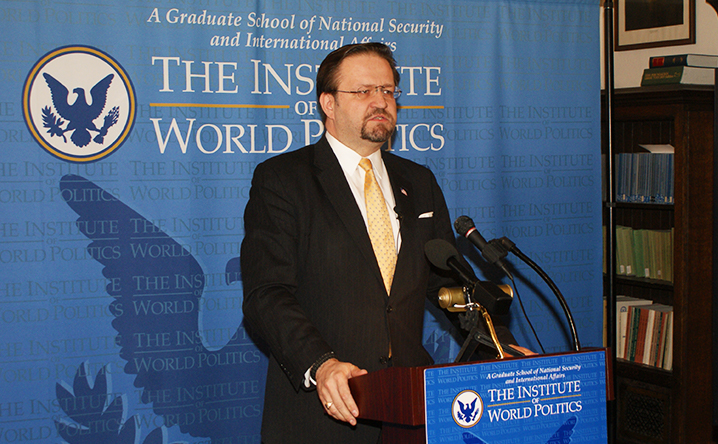Sebastian Gorka never became a household name among the counterterrorism experts who populate K Street think tanks and university international relations departments during his years in Washington, D.C. Now he is President Donald Trump’s deputy assistant.
While Gorka, a former Breitbart News national security editor and fixture on Fox News, published the New York Times bestseller “Defeating Jihad: The Winnable War,” held various positions at military educational institutions and even testified before the House Armed Services Committee on the threat of “global jihadism,” he was little-known in mainstream D.C. circles before the 2016 election year.
Some foreign policy and counterterrorism experts declined to speak to TPM on the record because of Gorka’s position in the new administration. But others characterized him as a peripheral figure whose hardline ideas about Islam and the threat posed by the Islamic State terror group place him firmly outside the mainstream.
“I’d heard the name once or twice but he’s not a major figure in the field. He’s not someone whose work one needs to know to be conversant in these issues,” Stephen Biddle, an adjunct senior fellow for defense policy at the Council on Foreign Relations and professor of political science at George Washington University, told TPM.
Biddle added that Gorka is not “in the reasonable mainstream.” Omid Safi, director of Islamic Studies at Duke University, was much more biting in his assessment, labeling Gorka’s book “propaganda.”
“He opines on everything from the Koran to Mohamad to jihad to Islamic history to contemporary politics but does so in a way that is inaccurate, sloppy, superficial, bigoted and ideological,” Safi said.
Gorka’s resume details a long list of short-term professorships and work for small conservative think tanks, several of which he founded with his wife, Katharine, a national security analyst who served on Trump’s Department of Homeland Security landing team. The people TPM spoke with who work on counterterrorism issues said they weren’t familiar with those Gorka-founded organizations, including Threat Knowledge Group, a consulting firm that claimed to provide strategic advice to the FBI, Army and Office of the Director of National Intelligence.
Threat Knowledge Group’s website, like Gorka’s own, has been taken offline since he joined the administration in late January.
Since joining the Trump White House, Gorka has swiftly become the public face of Trump’s foreign policy, making dozens of radio and cable appearances to tout the President’s focus on defeating “radical Islam” via an executive order on immigration. A White House spokeswoman on Wednesday declined to respond to TPM’s request for comment on how experts characterized Gorka’s past work and what his role as deputy assistant to Trump entails.
Gorka’s name and views appear to have a higher profile among experts on Islamophobia than in the counterterrorism community.
Engy Abdelkalder, adjunct professor at Georgetown University’s Walsh School of Foreign Service, noted that like Trump’s chief strategist Steve Bannon, Gorka has ties to anti-Muslim conspiracy theorist Frank Gaffney.
“He has frequently appeared on Gaffney’s radio program to further such fears and misconceptions about Islam and Muslims,” Abdelkalder told TPM in an email. “And what makes him particularly pernicious is his academic credentials and now, prestigious political appointment, extend an appearance of legitimacy to anti-Muslim bigotry and prejudice.”
Since at least 2013, Gorka has served as a frequent guest at events and on a radio show hosted by Gaffney, the founder of the Center for Security Policy, a D.C. based anti-Islam think tank. Gaffney has heavily promoted the conspiracy theory that members of the Muslim Brotherhood have infiltrated the U.S. government and argued that the Council on American Islamic Relations, a civil rights group, is affiliated with terrorists.
Gorka has made the same arguments himself. He has also said that accepting Muslim refugees would be “national suicide” and that religious profiling of Muslims is a “synonym for common sense.”
One of the primary arguments Gorka laid out both in his 2016 book and in his posts for Breitbart is that the U.S. and Europe are losing the war against ISIL because political correctness prevents their leaders from addressing the religious roots of “global jihadism.”
That’s an about-face from the point he made in his Ph.D. dissertation at Hungary’s Corvinus University, in which Gorka wrote that using such “inflammatory” terms does “a great disservice to law-abiding Muslims” and gives terrorists “an undeserved sense of quasi religious legitimacy.”
Shadi Hamid, a senior fellow at the Brookings Institute, said such a focus—which the President shares—on using religious terms to discuss the threat ISIL fails to address key strategic issues.
“A phrase is a phrase,” he said. “What’s never been made clear by the Trump administration or people who share this view is how does using phrases like ‘radical Islamic terrorism’ actually translate into policy. How does using these magic words actually make a difference?”
“We certainly don’t have any analysis that points to what is effectively an issue of semantics being a significant part of why it’s been so difficult to defeat the Islamic State,” Chris Chivvis, foreign policy expert at the RAND Corporation, concurred.
Safi, of the Duke Islamic Studies Center, argued that the scholarship Gorka presented in his book was shoddy and took ISIL’s claims that they represent the true version of Islam at face value, thus fueling the group’s narrative of a war between East and West.
His book “is like reading a bad high school student’s paper that has been cribbed together from Wikipedia, and that’s with all due respect to Wikipedia,” Safi said.
“Frankly it is not only embarrassing, it is dangerous that someone like this has the ear of the President.”










